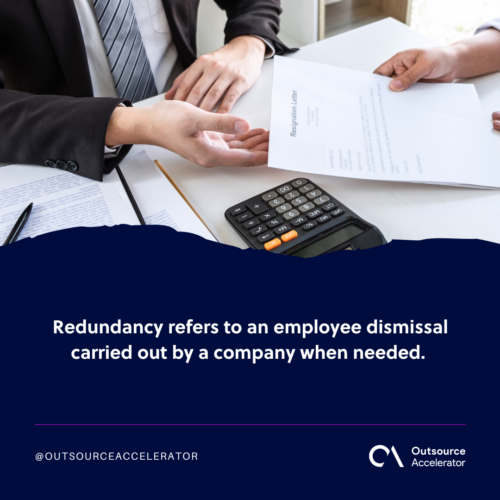Redundancy
Definition
What is redundancy?
Redundancy refers to an employee dismissal carried out by a company when needed. There are plenty of reasons companies have to lay off workers and employees, but no executive or manager wants to call in redundancy as much as possible.

Choosing employees for redundancy
When the redundancy effort is well underway, one of the hardest things an employer needs to do is choose which employees should be let go.
To ease the process, companies choose according to the following criteria:
Feedback
Feedback from both managers and workers is important when it comes to determining whether certain employees have been productive members of the team. If the feedback says otherwise, then the choice will become a bit clearer.
KPIs
Slackers, time-wasters, and procrastinators are often the kind of employees that can hinder the team’s growth in the long run. If their key performance indicators (KPIs) aren’t up to par with the projections, they are a target for redundancy.
Freelancers and independent contractors
Both freelancers and independent contractors have different contracts from those employed inside the company. With the appropriate professional notice, companies tend to let go of freelancers first.
3 reasons redundancy is needed
There are times when redundancies must be done in order to save the business from bankruptcy and more expenses. Companies often do cost-saving activities to lessen expenses, but there are times when it’s not enough.
Lower demand for services and products
As recently as 2020, economic crashes and recessions swept across different industries.
As a result, factories and other manual labor businesses had to cut down their labor force via redundancies, mass lay-offs, and retrenchments.
New technology
Menial and repetitive tasks are often the targets whenever companies acquire new tools and software.
For example, instead of visitors calling a receptionist for an appointment, they can be redirected to an interactive voice response (IVR) system. By doing so, the company will only have to pay for the system, making the phone operator’s job redundant.
Department or company closure
One of the most expected reasons to induce a mass lay-off is company closure. May the reasons be a company buyout or bankruptcy, dealing with a business closing permanently is heartbreaking for everyone involved.

3 alternatives to employee redundancy
Redundancy can have a negative effect on the morale of the employees that remain. Here are some options to explore to avoid redundancy.
Reducing hours
While this could cause pushback from some full-time employees, reducing working hours could be the more effective way to cut back on costs without laying off workers.
Hiring freeze
Companies certainly won’t acquire new talents if they are having financial constraints. Freezing recruitment activities until things get settled is one of the ways to keep employees in the company.
Rotating employees
If redundancies can’t be avoided, affected employees can be handed off to another department—ideally within the same company. If their skills match with other positions in other departments, then this should be a viable option.







 Independent
Independent




